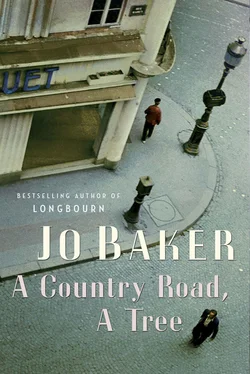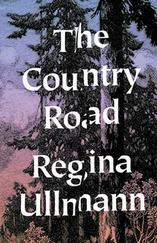—
Outside, the wind blundering around the Place Vendôme has a new chill to it. He offers Suzanne his arm and she takes it, and they walk along, huddled together against the cold.
“When we get back, you must write to your publisher. They will send references. They will say what you are.”
“I shall,” he says, though he does not feel the confidence that this suggests.
“And then you will be in good standing here at last.”
He nods. “I hope.”
The words, in French, do not sound quite so unlikely, so uncomfortable. J’espère.
In the Tuileries Gardens, fallen leaves bundle across the gravel. The dust, as they walk, whitens their shoes.
—
He writes his letter of application; he writes with some discomfort to London to request a brief reference from Mr. Read at Routledge. He stamps the envelope and sends it. It seems dreadfully importune of him. As though he is asking the man to take part in a deception on his behalf.
But nothing happens.
Or rather, things keep on happening, but to other people. Nothing happens to him.
When he heads out for morning bread, there’s a green van standing by the kerb on the rue des Favorites. It’s the type of vehicle that the locals call a panier à salade. You get packed in, shaken up and spun round in them. They are police vans.
His shoulders stiffen. He does not have his papers yet.
But it’s next door. He sees the porte cochère shoved open and a flic stepping over the sill on to the pavement, and a young man stumbling after, his dark hair rumpled and his shirt misbuttoned, straight from bed. A second policeman comes after them. People stop, stand back, so as not to become entangled. He finds himself amongst the bystanders, watching, without ever having meant to watch.
The young man gets into the back of the vehicle, looking baffled and angry; the door is shut on him; the officers get in too, one in the back, one in the front, and the van rumbles away over the cobbles, and that is that.
“Who was it?” a woman asks near by.
“Foreigner.”
“What has he done?”
“Don’t know.”
“Where will they take him?”
Another woman leans past him to answer; he smells her breath. “The Préfecture, the Santé, maybe.”
“Seems a shame, doesn’t it?”
“It’s what they’d get up to, left to themselves, isn’t that it?”
He keeps his own mouth shut. And he does nothing. It all seems at one remove from him, untouchable: someone has been lifted clean out of the everyday. And from that moment on, these people become ubiquitous, unmissable: the shabby-smart, the hounded, the dispossessed. When overheard, their accents vary, but there is a definite type: educated, thoughtful, softly spoken, terrified. They are the jetsam of half a dozen different nations; they’re fragile and exhausted. They’ve been washed up here by the floods at home.
Sometimes, like bus drivers raising a hand to each other in passing, he sees the moments when they notice each other: there is an uneasy snag and tear of the gaze, an urge for companionship, but an undertow of fear. Who would want to be associated with, who would want to belong to this community of un-belonging?
—
The autumn is gentle at the start, and things go on as normal, more or less. He tries to work, to make it matter that he be here. He plays a bit of tennis with Alfred Péron; they meet at cafés or the Pérons’ apartment to work on his translation. Mania greets him warmly and does not seem to mind Alfy wasting all this time on his Irish friend. Alfy has become a trusted companion in futility. They inchworm through the text of Murphy, sipping coffee or wine, smoke spooling round them, deep in the problem of turning his own particular English into his own particular French. There is about as much point to this as there is to the completion of a crossword puzzle: there is from time to time the pleasing shift and click of a problem solved, but that’s the sum of it. Once they’re done, all they’ll have achieved, he suspects, is a book that, having gone unread in English, can now go equally unread in French.
The heating still functions; there’s still hot water when he turns the tap and scrapes a razor; in the day the lift still churns up and down; there’s still the sound of the neighbours’ wireless set coming through the wall, tuned to Le Poste Parisien, and now and again that baby cries. He’d like to see Joyce, go out drinking with him, lose himself in the wash of booze and talk, but the Joyces are all out of town, and then they’re back again, and then they are away, and though a message is left it has not yet been returned, and it’s impossible to keep track of them.
“The sheets need washing,” Suzanne says.
“I know.”
“They’re starting to smell.”
“I know.”
“They feel greasy to me.”
“Yes.”
“Do you think the line will hold?”
Her thigh over his thigh, her hand on his chest, his scar underneath her thumb a purplish, ragged line: this damaged man is also the boy she recalls in tennis whites, starfished for a ball. The space between those moments sometimes seems just a tick, a tock. Sometimes it seems vast.
“What?” he asks, but he had heard her.
“Do you think the line will hold?” she asks again.
He rolls away and fumbles for a cigarette. He had been thinking, by association with the sheets, washing line, seen linen billow and snap. But she means Maginot. “I have no idea.”
“They put too much faith in it,” she says. “I think.”
“I daresay.”
“The generals go on as though it’s the answer to everything. For them it’s the last war all over again. But it’s not the same war, is it? So that damned line is not the answer.”
He lights up the cigarette, draws on it, then offers it to her. “It might be the same war. More or less.”
“Times have changed,” she says. “Things have moved on, haven’t they? The world goes faster now. The war will too.”
He watches as she takes a sip of smoke. Her lips, with the dip of a seagull in flight.
Over a cloud of outbreath, she says, “They’ll go round, won’t they? Load up in their Volkswagens and just motor on through.” A pause. “Perhaps you should have stayed in Ireland.”
He blinks at her, then rolls his head away and looks up at the ceiling, where a cobweb trails in the draught. He is not necessary here, though here is necessary to him. “Do you think so?”
“It won’t go on like this for ever, nothing happening. It won’t last. The drôle de guerre. It’ll stop being funny soon enough.”
“It’s not really funny now.”
“The Legation would help you if you were to leave.”
Mr. and Mrs. , the clerk had said.
“I can hardly breathe back there in Ireland. I certainly can’t write.”
“Well then.” Eyebrows up, lips pursed. “You must stay, whatever comes.”
He takes the cigarette back and smokes it.
She sits up, swings her legs out of the bed. “If I strip the bedclothes,” she says, “would you take the sheets down to the pressing ?”
—
Two streets away from the apartment, on the Place Falguière, one of those strays asks him politely for the time; he stops, consults his watch, tips it towards the other fellow, who nods. He also offers a cigarette. Eager thanks; a match is struck; he offers out the flame: the old man dips his head towards it.
To the rusty crown of a once-black bowler hat, he says, “You’re not from round here, are you?”
The old man looks up at him from under the brim, made wary. “What makes you say that?”
“Your accent.”
“You’ve got quite an accent there yourself.”
Читать дальше










